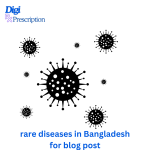
Prevalent Rare Diseases in Bangladesh
In Bangladesh, rare diseases present significant challenges due to limited awareness, diagnostic difficulties, and inadequate treatment options. These conditions, often overlooked, profoundly impact patients and their families.
Fibrodysplasia Ossificans Progressiva (FOP): A genetic disorder where soft tissues progressively turn into bone, restricting movement. A notable case involved a 14-year-old boy named Farid, whose family struggled with diagnosis and treatment due to financial constraints.
THEDAILYSTAR.NET
Progeria (Hutchinson-Gilford Syndrome): This condition causes accelerated aging in children. Anisur Rahman, a nine-year-old from Bangladesh, exhibited symptoms, but his family faced challenges in affording diagnostic services and treatment.
THEDAILYSTAR.NET
Myasthenia Gravis (MG): An autoimmune disorder leading to muscle weakness. Patients like Jakia Abedin have faced difficulties in accessing appropriate treatment due to high costs and limited availability of necessary medications.
THEDAILYSTAR.NET
Beta-Thalassemia: An inherited blood disorder resulting in reduced hemoglobin production. Bangladesh has a significant number of carriers and patients requiring regular blood transfusions and chelation therapy.
PMC.NCBI.NLM.NIH.GOV
Epidermodysplasia Verruciformis: Known as "Tree Man Syndrome," this condition leads to uncontrolled wart growth. Abul Bajandar from Khulna underwent multiple surgeries to remove extensive growths caused by this disease.
EN.WIKIPEDIA.ORG
Challenges in Addressing Rare Diseases
Diagnostic Delays: Limited awareness among healthcare professionals often leads to misdiagnosis or delayed diagnosis, exacerbating patient conditions.
Financial Constraints: High treatment costs are prohibitive for many families, especially in the absence of government support or insurance coverage.
Lack of Specialized Care: There is a scarcity of specialized healthcare facilities and professionals trained to manage rare diseases in Bangladesh.
Steps Forward
Addressing the challenges posed by rare diseases in Bangladesh requires a multifaceted approach:
Awareness Campaigns: Educating healthcare providers and the public about rare diseases can lead to earlier diagnosis and intervention.
Policy Development: Implementing government policies to subsidize treatment costs and support research into rare diseases is crucial.
Establishing Support Networks: Creating patient support groups can provide emotional assistance and practical advice to affected families.
By taking these steps, Bangladesh can improve the quality of life for individuals affected by rare diseases and their families.
References:
THEDAILYSTAR.NET
PMC.NCBI.NLM.NIH.GOV
EN.WIKIPEDIA.ORG
